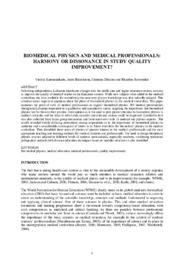| dc.contributor.author | Karenauskaite, Violeta | en |
| dc.contributor.author | Balzekiene, Aiste | en |
| dc.contributor.author | Dikcius, Gintaras | en |
| dc.contributor.author | Rotomskis, Ricardas | en |
| dc.coverage.spatial | CY - Λευκωσία | en |
| dc.date.accessioned | 2016-01-22T06:19:41Z | |
| dc.date.available | 2016-01-22T06:19:41Z | |
| dc.date.issued | 2008 | |
| dc.identifier.uri | http://hdl.handle.net/10797/14481 | en |
| dc.description | Περιέχει το πλήρες κείμενο | el_GR |
| dc.description.abstract | Following independence, Lithuania introduced changes into the health care and higher education sectors, in order
to improve the quality of medical studies in the European context. While new subjects were added to the medical
curriculum, the time available for assimilating the necessary physics knowledge was also radically reduced. This
situation raises important questions about the place of biomedical physics in the medical curriculum. This paper
examines the point of view of medical professionals as regards biomedical physics. 309 medical professionals
throughout Lithuania responded to a qualitative and quantitative survey targeting the importance that biomedical
physics has for them in their practice, their opinion as to the need to give greater attention to biomedical physics in
medical curricula, and the ways in which they consider curricula and courses could be improved. Qualitative data
was also collected from focus group discussions and from interviews with 18 medical and physics experts. The
results revealed widely differing perceptions among respondents as to the importance of biomedical physics in
medicine and a considerable convergence of views as to future directions for biomedical physics in the medical
curriculum. They identified those areas of physics of greatest interest to the medical professionals and the most
appropriate teaching and learning methods for medical students and professionals. The need to design biomedical
physics courses adapted to different levels of medical professionals, especially residents, combining traditional
pedagogical methods with distance education techniques based on modular structures is also identified. | en |
| dc.language.iso | eng | en |
| dc.publisher | University of Cyprus | en |
| dc.relation.ispartof | Advanced topics in physics education | en |
| dc.rights | info:eu-repo/semantics/openAccess | en |
| dc.title | Biomedical physics and medical professionals: harmony or dissonance in study quality Improvement? | en |
| dc.type | info:eu-repo/semantics/conferenceObject | en |
| dc.subject.uncontrolledterm | Biomedical physics | en |
| dc.subject.uncontrolledterm | Medical education | en |
| dc.subject.uncontrolledterm | Medical professionals | en |
| dc.subject.uncontrolledterm | Quality improvement | en |
| dc.contributor.conferenceorganizer | Department of Educational Science, University of Cyprus | en |
